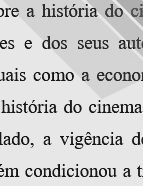

................................
Dividing his important activity between the two main public institutions linked to cinema, namely the IPC and the Cinemateca, from the late 1970s onwards, Matos-Cruz was able to compile an impressive collection of data on Portuguese cinema that led to the above-mentioned works and also to several precursory studies on issues that had been under studied until then.
Other authors from the Cinemateca included António J. Ferreira, author of Animatógrafos de Lisboa e Porto - Perspectiva e alguma História das salas de cinema silencioso 1894-1936 [Animatographs of Lisbon and Porto - Perspective and some History of the silent movie theatres 1894-1936] (Author’s edition, 6 vol, 1989), who collaborated in the research of Matos-Cruz's Prontuário (for the period 1896-1928); José Navarro de Andrade, coordinator of the catalogue Fernando Lopes por cá [Fernando Lopes around here] (1996); Manuel S. Fonseca, collaborator of the catalogues Cinemateca 25 Anos [Cinematheque 25 years](1983), 25 de Abril – Imagens [25 April – Images] (1984) and Cinema Novo Português 1960-74 [New Portuguese Cinema 1960-74] (1985); Manuel Cintra Ferreira, collaborator of the catalogues António Silva (1986), Aníbal Contreiras (1987), Lisboa Filme, Um sonho vencido [ Lisboa Film – A Conquered Dream] (1987), Sonoro Filmes [Sound Films] (1988); José Manuel Costa, who dedicated special attention to the Portuguese cinematographic heritage in Cem Anos de Cinema em Portugal: o estado do património [One hundred Years of Cinema in Portugal the status of heritage] (Cinemateca, 1995), and to the study of the Novo Documentário em Português [New Documentary in Portuguese] (Cinemateca, 1999); and Tiago Baptista, a particularly attentive author to the silent film period in Portugal, responsible for Lion, Mairaud, Pallu:franceses tipicamente portugueses [Lion, Mairaud, Pallu: typically Portuguese Frenchmen] (Cinemateca Portuguesa, 2003) and As cidades e os films: uma biografia de Rino Lupo [Cities and Films: a biography of Rino Lupo] (Cinemateca Portuguesa, 2008).
Finally, João Bénard da Costa, Luís de Pina's successor as director of the institution, is one of the indispensable references in Portugal's cultural landscape of the last four decades. Devoting particular attention to cinema from the late 1960s onwards, around the time he became director of the Calouste Gulbenkian Foundation's film department, Bénard da Costa gradually became a significant reference in film criticism in Portugal.
